Overview of the Role of Industrial Electricians
Industrial electricians are skilled professionals responsible for installing, maintaining, and repairing electrical systems in industrial settings. These environments include factories, power plants, manufacturing facilities, and other large-scale industrial operations. Unlike residential or commercial electricians, industrial electricians work with more complex and high-powered electrical systems. Their job often involves working with heavy machinery, control systems, and large-scale electrical networks that are vital to the daily operations of an industry.
Industrial electricians must ensure that electrical systems are functioning safely and efficiently. They play a critical role in preventing electrical hazards, minimizing downtime, and maintaining the overall productivity of an industrial facility. Their work is crucial not only for the smooth running of industrial operations but also for the safety of the workers who rely on these systems every day.
Purpose of the Post
The purpose of this post is to explore the vital role that industrial electricians play in various industries. We will look into their key responsibilities, the skills and qualifications required for the job, and the impact they have on industrial safety and efficiency. Additionally, we will discuss the challenges they face in their work and how they navigate these challenges in an increasingly technological world.
Understanding the significance of industrial electricians is essential for appreciating the complexity and importance of their work. This post aims to highlight the crucial contributions of industrial electricians to the industrial sector and encourage a deeper appreciation for the professionals who keep our industries running smoothly and safely. Whether you are considering a career in this field or simply want to learn more about the role, this post will provide valuable insights into the world of industrial electricians.
Key Responsibilities of Industrial Electricians
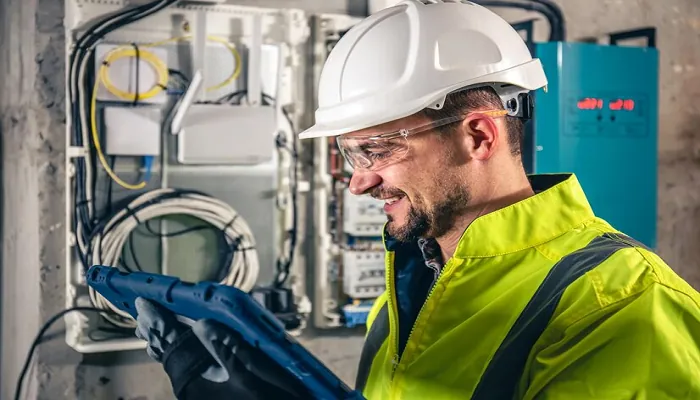
Installation and Maintenance of Electrical Systems
One of the primary responsibilities of industrial electricians is the installation and maintenance of electrical systems in industrial environments. These systems are often complex and high-powered, designed to support heavy machinery and large-scale operations. Industrial electricians are responsible for setting up these systems from scratch, which involves wiring, connecting circuits, and ensuring that all components are properly installed and functioning. They also perform regular maintenance to keep these systems running smoothly. This includes inspecting electrical components, replacing worn-out parts, and making adjustments to optimize performance.
Troubleshooting and Repair of Electrical Equipment
Industrial electricians are skilled at troubleshooting and repairing electrical equipment. When an electrical issue arises in an industrial setting, it can lead to significant downtime, costing the company time and money. Industrial electricians use their expertise to quickly identify the root cause of the problem and carry out the necessary repairs. This could involve diagnosing issues with motors, generators, transformers, or control systems. They use specialized tools and techniques to fix these problems and restore the equipment to full working order. Their ability to troubleshoot effectively is critical to minimizing downtime and keeping industrial operations running smoothly.
Ensuring Safety and Compliance
Safety is a top priority for industrial electricians. They must ensure that all electrical systems and installations comply with industry standards, electrical codes, and regulations. This involves following strict safety protocols during installation, maintenance, and repair work to prevent accidents and electrical hazards. Industrial electricians are also responsible for conducting safety inspections and ensuring that all electrical systems are properly grounded and insulated. Compliance with regulations is essential not only for the safety of the workers but also for avoiding legal issues and fines. By adhering to safety standards and regulations, industrial electricians help create a safer working environment and ensure the long-term reliability of industrial electrical systems.
Skills and Qualifications
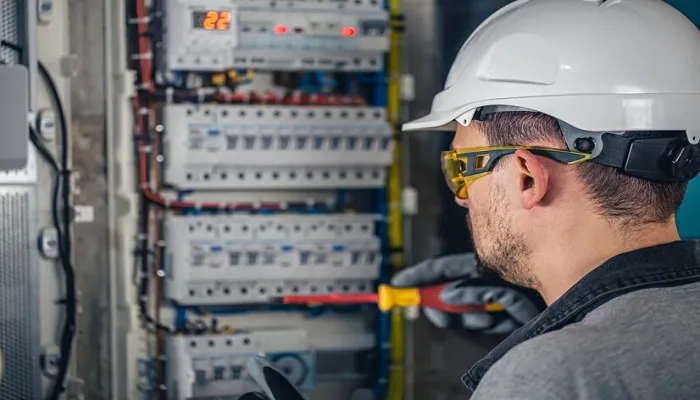
Essential Skills
Industrial electricians need a strong set of skills to perform their job effectively. Technical expertise is crucial, as they must understand complex electrical systems and know how to install, maintain, and repair them. This includes knowledge of wiring, circuits, and electrical components used in industrial settings. Problem-solving is another key skill. Industrial electricians often face challenging situations where they must quickly diagnose and fix electrical issues to prevent downtime in industrial operations. This requires not only technical knowledge but also the ability to think critically and find effective solutions under pressure. Attention to detail is equally important, as even small mistakes in wiring or connections can lead to significant problems, including safety hazards or equipment failure. Industrial electricians must work carefully and meticulously to ensure everything is done correctly.
Required Qualifications and Certifications
To become an industrial electrician, certain qualifications and certifications are required. Most industrial electricians start with a high school diploma or equivalent, followed by technical training at a trade school or community college. This education covers electrical theory, blueprint reading, and safety practices. After completing their education, aspiring industrial electricians typically need to complete an apprenticeship, where they gain hands-on experience under the supervision of experienced professionals. In addition to this practical training, industrial electricians often need to obtain specific certifications or licenses, depending on the region or country they work in. For example, in the United States, passing a licensing exam is typically required to work independently as an industrial electrician.
Importance of Continuous Training and Education
The field of industrial electrical work is constantly evolving, with new technologies and standards emerging regularly. Because of this, continuous training and education are essential for industrial electricians. Staying up-to-date with the latest advancements in electrical systems, safety regulations, and best practices allows them to maintain their skills and remain competitive in the job market. Many employers require industrial electricians to participate in ongoing training programs or workshops to ensure they are knowledgeable about the latest industry developments. By committing to lifelong learning, industrial electricians can enhance their expertise, improve job performance, and ensure they are always prepared to meet the demands of their profession.
The Role in Industrial Safety
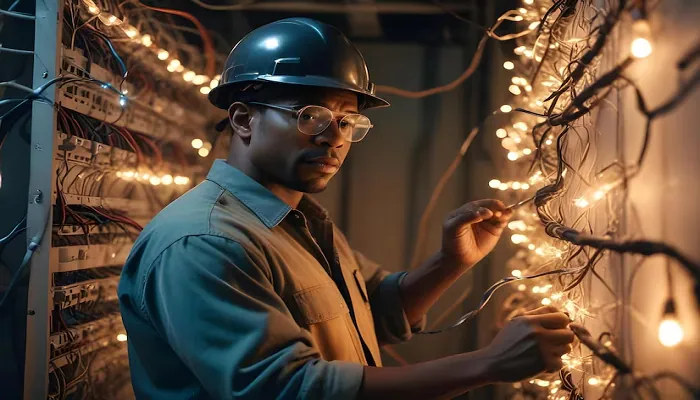
Contribution to Workplace Safety
Industrial electricians play a crucial role in maintaining and enhancing workplace safety. They are responsible for ensuring that all electrical systems in industrial settings are installed correctly and function safely. By doing so, they help prevent electrical hazards such as short circuits, electrical fires, and equipment malfunctions that could lead to injuries or even fatalities. Their expertise in identifying potential risks and addressing them before they become serious problems is vital for creating a safe working environment. Additionally, industrial electricians often work closely with other safety professionals to develop and implement safety protocols, ensuring that all electrical work complies with industry standards and regulations.
Importance of Regular Inspections and Preventive Maintenance
Regular inspections and preventive maintenance are key aspects of an industrial electrician’s role in promoting safety. By conducting routine checks on electrical systems and equipment, they can identify wear and tear, faulty wiring, or other issues that could pose a danger if left unaddressed. Preventive maintenance involves making necessary repairs or adjustments before problems arise, which not only enhances safety but also reduces the risk of costly downtime in industrial operations. These proactive measures help to ensure that the electrical systems continue to operate efficiently and safely, minimizing the likelihood of accidents and maintaining the overall integrity of the industrial facility.
Case Studies of Safety Improvements
There are numerous examples of how industrial electricians have led safety improvements in various industrial settings. For instance, in a manufacturing plant, regular inspections by industrial electricians revealed outdated wiring that was prone to overheating. By replacing the old wiring with new, safer materials, the risk of electrical fires was significantly reduced, enhancing overall workplace safety. In another case, an industrial electrician identified a malfunctioning circuit breaker that had caused several small electrical fires. By upgrading the circuit breaker and installing additional safety features, the electrician was able to prevent future incidents and improve the plant’s safety record. These examples highlight the vital role industrial electricians play in ensuring the safety and well-being of workers in industrial environments.
Impact on Industrial Efficiency
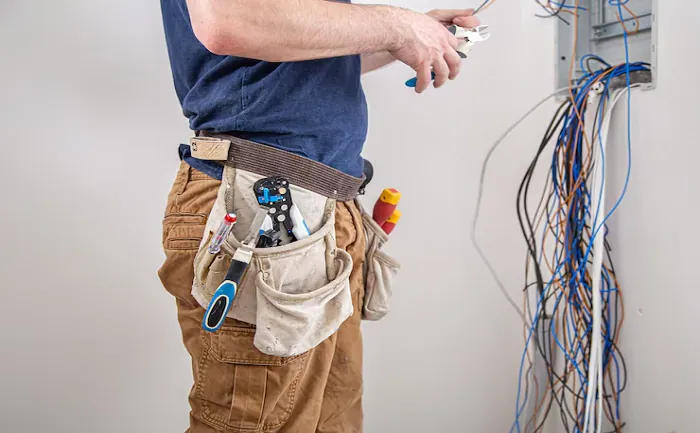
Minimizing Downtime and Ensuring Operational Efficiency
Industrial electricians are essential in maintaining and improving the efficiency of industrial operations. One of their primary roles is to minimize downtime caused by electrical issues. When electrical systems fail or malfunction, it can halt production lines, disrupt operations, and lead to significant financial losses. Industrial electricians work to prevent these disruptions by ensuring that all electrical systems are functioning correctly and are well-maintained. Their expertise in quickly diagnosing and fixing problems helps to get operations back on track with minimal delay. By reducing the frequency and duration of electrical failures, industrial electricians contribute to the overall efficiency and productivity of industrial facilities.
Cost Savings Through Effective Electrical Maintenance
Effective electrical maintenance performed by industrial electricians can lead to substantial cost savings for industrial operations. Regular maintenance prevents small issues from becoming major problems that require costly repairs or replacements. For example, routine inspections can detect a failing component in an electrical system before it causes a complete breakdown, allowing for a simple and inexpensive fix rather than an extensive and costly repair. Additionally, well-maintained electrical systems operate more efficiently, consuming less energy and reducing utility costs. By keeping equipment in optimal working condition, industrial electricians help to lower operating expenses and extend the lifespan of machinery, resulting in long-term financial benefits for the company.
Importance of Proactive Electrical System Management
Proactive management of electrical systems is critical in maintaining industrial efficiency. Industrial electricians play a key role in this by planning and implementing regular maintenance schedules, upgrading outdated systems, and installing new technologies that enhance efficiency. Proactive management involves anticipating potential issues and addressing them before they impact operations. This forward-thinking approach ensures that the industrial facility remains productive and avoids unexpected downtime. By taking a proactive stance, industrial electricians not only keep the electrical systems running smoothly but also contribute to the overall success and profitability of the industrial operation.
Challenges Faced by Industrial Electricians
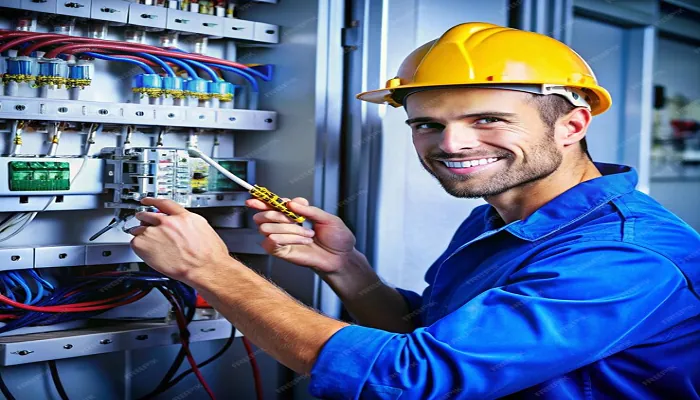
Working in Hazardous Environments
One of the most significant challenges industrial electricians face is working in hazardous environments. Industrial settings often involve exposure to high voltages, dangerous machinery, extreme temperatures, and confined spaces. These conditions require electricians to be constantly vigilant about their safety and the safety of others. They must adhere to strict safety protocols, wear protective gear, and maintain a thorough understanding of the risks involved in their work. The hazardous nature of their job demands a high level of caution and precision to prevent accidents and ensure that electrical systems are installed and maintained safely.
Dealing with Complex Systems
Industrial electricians often work with complex electrical systems that require specialized knowledge and skills. These systems can include large-scale power distribution networks, automated production lines, and intricate control systems. Troubleshooting and repairing such systems can be challenging, as they involve understanding and navigating a wide range of components and technologies. Additionally, industrial electricians must be capable of diagnosing issues quickly to minimize downtime in the facility. The complexity of the systems they work with demands a deep understanding of electrical engineering principles and the ability to think critically and solve problems effectively.
Adaptability and Quick Decision-Making
The fast-paced and unpredictable nature of industrial environments requires electricians to be highly adaptable and capable of making quick decisions. Unexpected electrical issues can arise at any time, and electricians must be prepared to respond promptly and efficiently. This often involves assessing the situation quickly, determining the best course of action, and executing it under pressure. The ability to remain calm and focused in high-pressure situations is essential, as even small mistakes can have significant consequences.
Navigating Technological Advancements
As technology and automation continue to advance, industrial electricians must continuously update their skills and knowledge. New technologies, such as advanced control systems, automation, and smart grids, are becoming increasingly common in industrial settings. Electricians must stay current with these developments to effectively install, maintain, and repair modern electrical systems. This ongoing need for education and training presents a challenge, as it requires electricians to be lifelong learners, constantly adapting to new technologies and methodologies to remain effective in their roles.
Future Outlook for Industrial Electricians
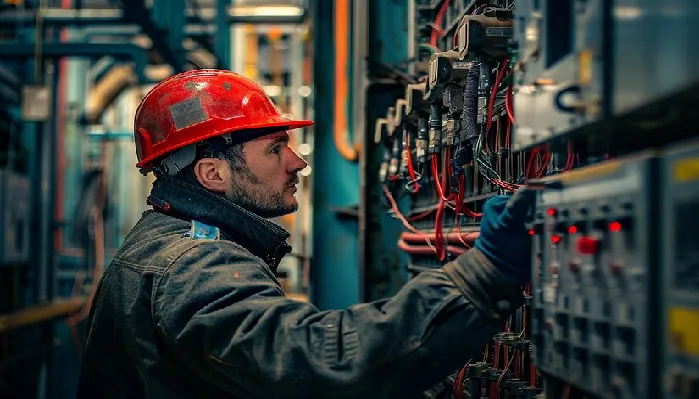
Emerging Trends in the Industry
The role of industrial electricians is evolving rapidly as new technologies and trends emerge. Automation and smart systems are becoming increasingly common in industrial settings, transforming how electrical systems are designed, installed, and maintained. These technologies allow for more efficient and precise control of industrial processes, but they also require electricians to develop new skills. Electricians must become proficient in working with automated systems, robotics, and smart devices that communicate with one another. This shift towards more advanced technology is reshaping the industry, making it essential for industrial electricians to stay up-to-date with the latest developments.
The Evolving Role in Industry 4.0
As we enter the era of Industry 4.0, which emphasizes the use of digital technologies and data-driven decision-making, the role of industrial electricians is becoming more critical than ever. Industry 4.0 involves integrating the Internet of Things (IoT), artificial intelligence (AI), and big data into industrial operations. Industrial electricians are now responsible for ensuring that these interconnected systems operate smoothly and efficiently. This requires a deep understanding of both traditional electrical systems and modern digital technologies. The evolving role of electricians in this context means they are not just maintaining equipment but also contributing to the optimization of industrial processes through the use of advanced technologies.
Opportunities for Growth and Specialization
The future of industrial electricians looks promising, with many opportunities for growth and specialization. As industries continue to adopt new technologies, there will be a growing demand for electricians with specialized knowledge in areas such as automation, renewable energy, and smart grid technology. Electricians who invest in learning these new skills will be well-positioned for career advancement and job security. Additionally, the increasing focus on sustainability and energy efficiency in industrial settings opens up new avenues for electricians to specialize in green technologies and energy management systems, further expanding their career opportunities.
In summary, the future for industrial electricians is bright, with emerging trends and technologies offering numerous opportunities for growth, specialization, and continued relevance in the industry.
Industrial electricians play a crucial role in keeping various industries running smoothly. Their expertise in installing, maintaining, and repairing complex electrical systems is essential for ensuring safety and efficiency in industrial settings. Recognizing and supporting industrial electricians is important, as their work is often behind the scenes but vital to everyday operations. For those considering a career in electrical work, specializing in the industrial sector offers opportunities for growth and impact. By choosing this path, aspiring electricians can contribute significantly to industry safety and efficiency, while also benefiting from a rewarding and dynamic profession.
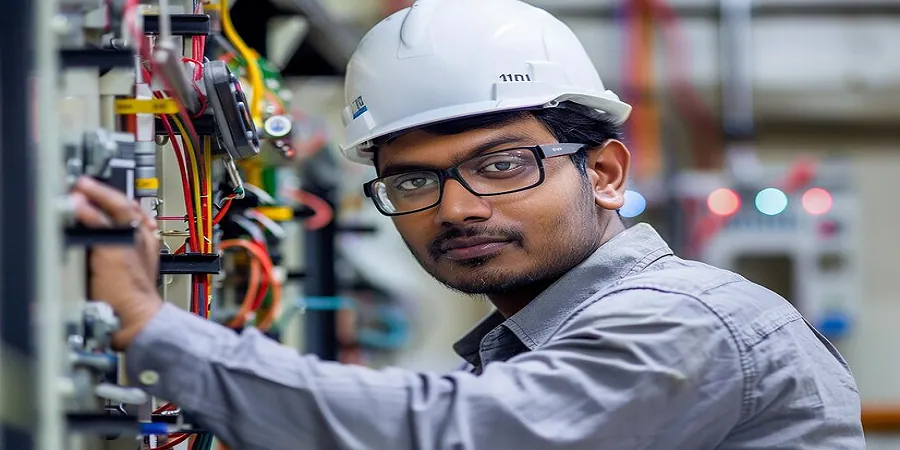
Comments